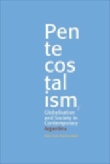Tyck till om SwePub Sök här!
onr:"swepub:oai:gup.ub.gu.se/216848"
Sökning: onr:"swepub:oai:gup.ub.gu.se/216848" > Pentecostalism, Glo...
- 1 av 1
- Föregående post
- Nästa post
- Till träfflistan
Pentecostalism, Globalisation and Society in Contemporary Argentina
-
- Aasmundsen, Hans Geir (författare)
- Gothenburg University,Göteborgs universitet,Institutionen för litteratur, idéhistoria och religion,Department of Literature, History of Ideas, and Religion
- (creator_code:org_t)
- ISBN 9789186069766
- 2014
- Engelska.
- Doktorsavhandling (övrigt vetenskapligt/konstnärligt)
Abstract
Ämnesord
Stäng
- In Argentina, Pentecostalism had a breakthrough in the early 1980s, and today more than 10 per cent of the population are Pentecostals. The revival coincided with a socio-political transformation of Argentinean society. After half a century of dictatorships and Peronism, democracy was restored, and structural changes paved the way for a certain “autonomisation” of politics, law, economy, science and religion. The "new" form of society that developed resembles what in this study is called a Western model, which to a large degree is currently being diffused on a global scale. This work examines the new religious sphere and how Pentecostals relate to society at large, and the political and judicial sphere in particular. Social systems theory and an idea of communication as constitutive of social spheres, such as religious, political and judicial ones, form the theoretical foundation for the study. Methods that have been used are fieldwork, interviews and analyses of written material. It is concluded that evangelization and transformation are of major concern to Pentecostals in contemporary Argentina and that this follows a global trend. Evangelisation has always been important to, even a hallmark of, Pentecostalism. What has become as important is the urge for transformation, of the individual, the family and society. This leads to increased socio-political engagement. However, Pentecostals do not have a “fixed” idea of how society should be organised, i.e., they do not yet have a full-fledged political theology, a public theology or what could be called a Pentecostal ideology. This is mainly because they experience a lack of “compatibility” between the Pentecostal and the political communication. Their approaches to socio-political concerns seem to be based on an understanding of certain “values” as the fundamental building block of society.
Ämnesord
- HUMANIORA -- Filosofi, etik och religion (hsv//swe)
- HUMANITIES -- Philosophy, Ethics and Religion (hsv//eng)
- HUMANIORA -- Språk och litteratur (hsv//swe)
- HUMANITIES -- Languages and Literature (hsv//eng)
Nyckelord
- Pentecostalism and Globalisation
- Argentinean society
Publikations- och innehållstyp
- vet (ämneskategori)
- dok (ämneskategori)
Hitta via bibliotek
- Pentecostalism, Globalisation and Society in Contemporary Argentina (Sök publikationen i LIBRIS)
Till lärosätets databas
- 1 av 1
- Föregående post
- Nästa post
- Till träfflistan
Hitta mer i SwePub
- Av författaren/redakt...
- Aasmundsen, Hans ...
- Om ämnet
-
- HUMANIORA
- HUMANIORA
- och Filosofi etik oc ...
-
- HUMANIORA
- HUMANIORA
- och Språk och litter ...
- Av lärosätet
- Göteborgs universitet
Sök utanför SwePub
- Sök vidare i:
- Google Book Search
- Google Scholar
Kungliga biblioteket hanterar dina personuppgifter i enlighet med EU:s dataskyddsförordning (2018), GDPR. Läs mer om hur det funkar här.
Så här hanterar KB dina uppgifter vid användning av denna tjänst.
- Copyright © LIBRIS - Nationella bibliotekssystem
- LIBRIS.kb.se

